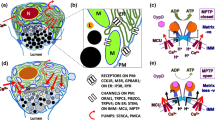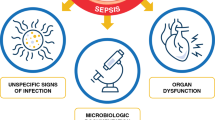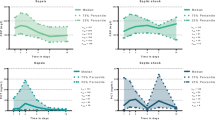Abstract
Background
Delayed colectomy can be life-threatening for patients with acute severe ulcerative colitis (ASUC). However, few biomarkers can predict the outcomes of ASUC patients before treatment. Serum procalcitonin (PCT) has been observed to be increased in ASUC patients.
Aim
The aim of this study was to estimate the association between serum PCT and short-term outcomes in patients with ASUC.
Methods
A single-center observational study was conducted at a referral hospital from January 2012 to January 2018. Hospitalized ASUC patients, who were administered intravenous corticosteroids (IVCS), were enrolled and followed up for 6 months. The primary outcome was IVCS failure; the secondary outcome was colectomy. Relationships between indicators and clinical outcomes were assessed.
Results
Of 152 ASUC patients enrolled in this study, 81 responded to IVCS and 71 failed (62 required short-term colectomy and 9 responded to second-line rescue therapy). Serum PCT on admission was significantly higher in IVCS-failure cases and surgical cases than in medical responders. Serum PCT ≥ 0.10 µg/L (OR = 4.134, p = 0.001) predicted IVCS failure with specificity of 0.741, and the combined measurement with fecal calprotectin (FC) ≥ 1500 µg/g improved the sensitivity. Serum PCT correlated significantly with the Ulcerative Colitis Endoscopic Index of Severity (r = 0.416, p < 0.001) and FC (r = 0.384, p < 0.001).
Conclusion
Serum PCT on admission could be a potential early non-invasive predictive biomarker for IVCS failure in ASUC patients, and a combination of PCT and FC could improve the predictive value.




Similar content being viewed by others
Abbreviations
- Alb:
-
Albumin
- ASUC:
-
Acute severe ulcerative colitis
- CRP:
-
C-reactive protein
- ESR:
-
Erythrocyte sedimentation rate
- FC:
-
Fecal calprotectin
- Hb:
-
Hemoglobin
- IVCS:
-
Intravenous corticosteroids
- MODS:
-
Multiple organ dysfunction syndrome
- PCT:
-
Procalcitonin
- UCEIS:
-
Ulcerative Colitis Endoscopic Index of Severity
References
Turner D, Walsh CM, Steinhart AH, et al. Response to corticosteroids in severe ulcerative colitis: a systematic review of the literature and a meta-regression. Clin Gastroenterol Hepatol. 2007;5:103–110.
Dinesen LC, Walsh AJ, Protic NM, et al. The pattern and outcome of acute severe colitis. J Crohns Colitis. 2010;4:431–437.
Travis S, Satsangi J, LéMann M. Predicting the need for colectomy in severe ulcerative colitis: a critical appraisal of clinical parameters and currently available biomarkers. Gut. 2011;60:3–9.
Randall J, Singh B, Warren BF, et al. Delayed surgery for acute severe colitis is associated with increased risk of postoperative complications. Br J Surg. 2010;97:404–409.
Travis SP, Farrant JM, Ricketts C, et al. Predicting outcome in severe ulcerative colitis. Gut. 1996;38:905–910.
Lindgren SC, Flood LM, Kilander AF, et al. Early predictors of glucocorticosteroid treatment failure in severe and moderately severe attacks of ulcerative colitis. Eur J Gastroenterol Hepatol. 1998;10:831–835.
Ho GT, Mowat C, Goddard CJ, et al. Predicting the outcome of severe ulcerative colitis: development of a novel risk score to aid early selection of patients for second-line medical therapy or surgery. Aliment Pharmacol Ther. 2004;19:1079–1087.
Bernardo S, Fernandes, SR, Goncalves, AR, et al. Predicting the course of disease in hospitalized patients with acute severe ulcerative colitis. Inflamm Bowel Dis. 2018 (EPub).
Xie T, Zhang T, Ding C, et al. Ulcerative Colitis Endoscopic Index of Severity (UCEIS) versus Mayo Endoscopic Score (MES) in guiding the need for colectomy in patients with acute severe colitis. Gastroenterol Rep. 2018;6:38–44.
Navaneethan U, Kochhar G, Phull H, et al. Severe disease on endoscopy and steroid use increase the risk for bowel perforation during colonoscopy in inflammatory bowel disease patients. J Crohns Colitis. 2012;6:470–475.
Müller B, White JC, Nylen ES, et al. Ubiquitous expression of the calcitonin-1 gene in multiple tissues in response to sepsis. J Clin Endocrinol Metab. 2001;86:396–404.
Snider RH Jr, Nylen ES, Becker KL. Procalcitonin and its component peptides in systemic inflammation: Immunochemical characterization. J Investig Med. 1997;45:552–560.
Domenech VS, Nylen ES, White JC, et al. Calcitonin gene-related peptide expression in sepsis: postulation of microbial infection-specific response elements within the calcitonin I gene promoter. J Investig Med. 2001;49:514–521.
Biju PG, Garg S, Wang W, et al. Procalcitonin as a predictive biomarker for total body irradiation induced bacterial load and lethality in mice. Shock. 2012;38:170–176.
Dandona P, Nix D, Wilson MF, et al. Procalcitonin increase after endotoxin injection in normal subjects. J Clin Endocrinol Metab. 1994;79:1605–1608.
Wacker C, Prkno A, Brunkhorst FM, et al. Procalcitonin as a diagnostic marker for sepsis: a systematic review and meta-analysis. Lancet Infect Dis. 2013;13:426–435.
Oussalah A, Laurent V, Bruot O, et al. Additional benefit of procalcitonin to C-reactive protein to assess disease activity and severity in Crohn’s disease. Aliment Pharmacol Ther. 2010;32:1135–1144.
Koido S, Ohkusa T, Takakura K, et al. Clinical significance of serum procalcitonin in patients with ulcerative colitis. World J Gastroenterol. 2013;19:8335–8341.
Hosomi S, Yamagami H, Itani S, et al. Sepsis markers soluble IL-2 receptor and soluble CD14 subtype as potential biomarkers for complete mucosal healing in patients with inflammatory bowel disease. J Crohns Colitis. 2018;1:87–95.
Truelove SC, Witts LJ. Cortisone in ulcerative colitis; final report on a therapeutic trial. Br Med J. 1955;2:1041–1048.
Dignass A, Lindsay JO, Sturm A, et al. Second European evidence-based consensus on the diagnosis and management of ulcerative colitis Part 2: current management. J Crohns Colitis. 2012;6:991–1030.
Travis SP, Dan S, Krzeski P, et al. Developing an instrument to assess the endoscopic severity of ulcerative colitis: the Ulcerative Colitis Endoscopic Index of Severity (UCEIS). Gut. 2012;61:535–542.
Wehkamp J, Harder J, Weichenthal M, et al. Inducible and constitutive beta-defensins are differentially expressed in Crohn’s disease and ulcerative colitis. Inflamm Bowel Dis. 2003;9:215–223.
Laharie D, Bourreille A, Branche J, et al. Ciclosporin versus infliximab in patients with severe ulcerative colitis refractory to intravenous steroids: a parallel, open-label randomised controlled trial. Lancet. 2012;380:1909–1915.
Andrew RE, Lauria A, Puleo FJ, et al. Inpatient infliximab is ineffective at preventing colectomy for steroid refractory extensive colitis. J Surg Res. 2017;219:18.
Travis SP, Schnell D, Krzeski P, et al. Reliability and initial validation of the ulcerative colitis endoscopic index of severity. Gastroenterology. 2013;145:987–995.
Corte C, Fernandopulle N, Catuneanu AM, et al. Association between the ulcerative colitis endoscopic index of severity (UCEIS) and outcomes in acute severe ulcerative colitis. J Crohns Colitis. 2015;9:376–381.
Jain S, Kedia S, Bopanna S, et al. Faecal calprotectin and UCEIS predict short-term outcomes in acute severe colitis: prospective cohort study. J Crohns Colitis. 2017;11:1309–1316.
Hoch RC, Rodriguez R, Manning T, et al. Effects of accidental trauma on cytokine and endotoxin production. Crit Care Med. 1993;21:839–845.
Brophy MB, Nolan EM. Manganese and microbial pathogenesis: sequestration by the mammalian immune system and utilization by microorganisms. ACS Chem Biol. 2015;10:641–651.
Fagerhol MK. Calprotectin, a faecal marker of organic gastrointestinal abnormality. Lancet. 2000;356:1783–1784.
Jeon HH, Hyun JL, Jung HW, et al. Clinical outcomes and predictive factors in oral corticosteroid-refractory active ulcerative colitis. World J Gastroenterol. 2013;19:265–273.
Acknowledgments
We would like to thank Dr. Xiaowei Wu at Jinling Hospital for his critical reading of the manuscript.
Funding
This work was supported by the National Natural Science Foundation of China (Grant No. 81570506).
Author information
Authors and Affiliations
Contributions
HW, JW, and FW contributed to the conception and design of this study. HW, JL, KW, BY, and LZ made substantial contributions to data acquisition. HW, KW, YQ, LY, and YY contributed to data analysis, data interpretation, and drafting of the manuscript. HW, ZY, MY, JG, and FW contributed to revision and proofreading of the manuscript. All authors had full access to all the data in the study and agreed with this submission.
Corresponding author
Ethics declarations
Conflict of interest
The authors declare that they have no conflict of interest.
Ethical consideration
This study complied with the principles of the Declaration of Helsinki. Patients were informed of the design of this study and were given the opportunity to refuse participation. The study was approved by the ethics committee of Jinling Hospital and was registered in ClinicalTrials.gov (NCT03578692).
Electronic supplementary material
Below is the link to the electronic supplementary material.
Rights and permissions
About this article
Cite this article
Wu, Hm., Wei, J., Li, J. et al. Serum Procalcitonin as a Potential Early Predictor of Short-Term Outcomes in Acute Severe Ulcerative Colitis. Dig Dis Sci 64, 3263–3273 (2019). https://doi.org/10.1007/s10620-018-5446-0
Received:
Accepted:
Published:
Issue Date:
DOI: https://doi.org/10.1007/s10620-018-5446-0




